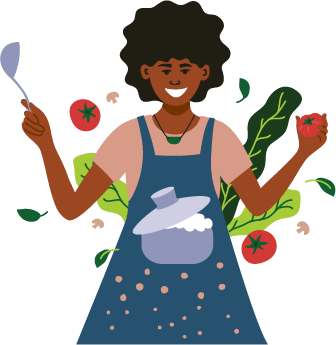Whole Foods versus Ultra-Processed Foods
Almost all foods we find in the supermarket have been processed in some way.
Some are better for our health than others, while others, mainly those that are ultra-processed have been linked to health problems like diabetes, heart disease and anxiety.
-
Contains ingredients not used in home cooking (ingredients you wouldn’t find in your pantry). These are ingredients such as chemicals, colourings and sweeteners, used to improve the food’s appearance, taste, texture and shelf-life.
Is often high in sugar, salt and saturated fats, and low in the nutrients that protect our health like fibre, vitamins and minerals.
Don’t tend to fill us up, so are very easy to overeat. Think of the family-sized packet of chips or bar of chocolate that you suddenly get to the end of without even noticing.e
Carrot versus potato chips
Did you know
Six carrots and 20g of potato chips have the same calories.
BUT
Chips are ultra processed – no longer a whole potato, with added fat, salt and preservatives
Carrots are a whole food and a great source of fibre and vitamins
It’s not saying we can never have any potato chips! Just be mindful that eating ultra processed foods all the time won’t nourishing our body or mind, and they are easy to overeat.
Remember that we can change our taste buds over time. The less sugary/salty food we have, the less we crave it.
How to look after your health in a world of processed foods
-
Such as vegetables, fruit, legumes, whole grains, nuts and seeds. Don’t count calories, count the number of plants you eat each week! Wholefoods can work out cheaper because they are more filling than ultra processed foods. They do require more planning and preparation.
-
e.g. canned and frozen fruit and vegetables, and wholegrain bread. They are convenient and look after your health, so add them to your weekly shop and meals.
-
“Eat anything you want, just cook it yourself” – Harry Balzer
By cooking most of our food ourselves, we simply can’t process it as much as a food company can. Feeling a little low in motivation and confidence in the kitchen? Check out our tips. -
Leave the sugary drinks on the shelf!
Make small changes - pick the easiest change first
Do what works for you to make the shift to more whole foods and less ultra-processed foods:
Switch from white bread to high fibre wholegrain bread (>5g dietary fibre/100g)
Add “one more vegetable” to your dinner meal/recipe
Have some wholefood snacks on hand e.g. nuts, fruit, high fibre crackers with hummus or tuna
Take a water bottle to work, the movies or sport rather than buying a sugary drink



